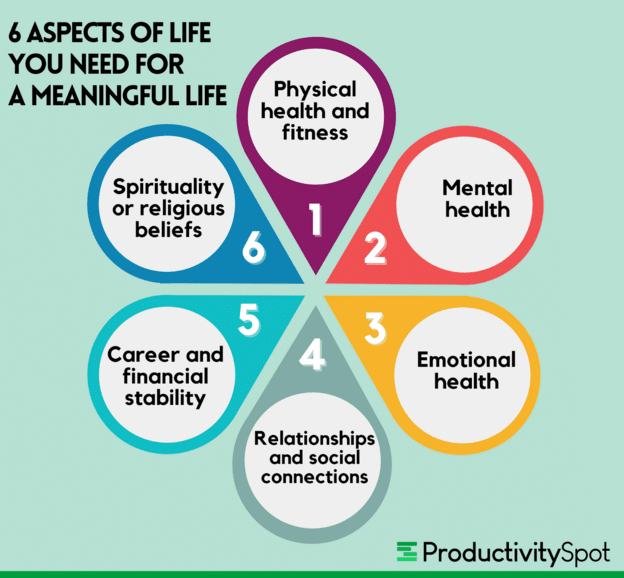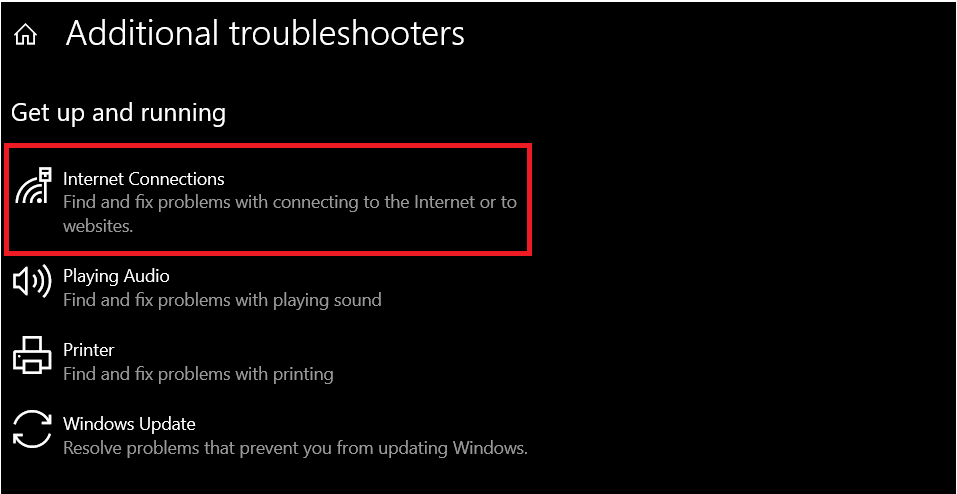Life can sometimes feel like a balancing act, especially when you need to juggle different aspects of it. But when you have a lot on your plate, it may feel overwhelming to figure out where and how to allocate your time and energy effectively.
Whether you’re feeling disconnected from your life or ready to reach new heights, understanding the significant aspects of life will give you the nudge you need to continue. After all, each of these areas is essential to your well-being, overall happiness, and satisfaction.
In this article, we’ll give you everything you need to know about the 6 most important aspects of life and how you can purposefully manage them. We have also packed this blog full of practical and actionable tips so you can elevate yourself and live a more fulfilling and well-rounded life.
This Article Covers:
What are the Aspects of Life?
The different aspects of life are domains that make up a person’s overall well-being. How you handle these areas makes up who you are. And while we’re sticking to the general categories of life, it’s important to note that some people might define these aspects differently based on their beliefs, priorities, and experiences.
In general, there are 6 different aspects of life we should balance to maintain a meaningful daily life:
- Physical health and fitness
- Mental health
- Emotional health
- Relationships and social connections
- Career and financial stability
- Spirituality or religious beliefs
Individuals who grew up with a nurturing upbringing and holistic life experiences that focused on their sense of touch, movement, life, balance, and warmth had the advantage of better shaping these 6 major life categories. On the other hand, not everyone may have had this opportunity. Regardless, you can gain more control over your personal growth by gaining a deeper understanding of yourself.
Understanding Your Life
Your self-discovery and personal growth are your responsibility. And having a clear understanding of the factors that shape your identity is crucial in this endeavor. You can get started using Likehack.org’s Life Assessment tool with a series of personal questions that assess where you are in life and how you are fighting your goals and priorities.
If you’re hesitant to understand the different aspects of your life, here’s why assessing your life is essential:
- Gain awareness – By identifying and understanding all aspects of your life, you gain a deeper awareness of what’s essential and what you should focus on.
- Know what to prioritize – If you know what aspects of life you need to improve, you will develop how to proceed.
- Help with self-reflection – Knowing yourself is the first step to taking responsibility for your life. It is time you reflect and identify areas of your life that you want to improve or make changes.
- Restore or maintain balance – Are you overexerting yourself at work and taking minimal rest? Are you unconsciously ignoring your personal relationships? It’s easy to neglect some areas of life. But when we make an effort to develop these aspects, we’re more likely able to maintain an overall balance.
- Help with personal growth – The more you focus on growing in different aspects of life, the closer you get to personal growth.
The 6 Aspects of Life That Matter Most
How do you define yourself? Do you clearly understand who you are and want to be? How do you imagine the best version of yourself? What do you need in life to achieve this vision? These are just some of the questions we ask ourselves when we want to take our lives to the next level.
These questions will answer themselves once you empower and achieve these 6 areas of life:

1. Physical Health
Physical health is considered one of the most important aspects of life. It directly impacts your ability to function and live a fulfilling life. Physical health is instrumental to achieving your goals and enjoying recreational activities. Being physically healthy helps you with the following:
- Functionality – Physical health is essential for basic body functioning. How can you commute to work if you have constant headaches, back pain, or grogginess due to lack of sleep? Good physical health allows individuals to carry out everyday activities and tasks easily, while poor physical health leads to reduced mobility and a lower quality of life.
- Mental health – Physical and mental health are dependent on each other. When you prioritize your physical health with regular exercise and commitment to a healthier lifestyle, you reduce the risk of mental illnesses like depression and anxiety.
- Productivity – Good physical health can improve an individual’s overall productivity. When your body is functioning well, it performs at its best, leading to better job performance and higher levels of success in your personal and professional life.
- Confidence – When your body performs at its best, you feel more confident and better about yourself. Feeling healthy and fit can also lead to a positive body image.
Improve your physical health by: Starting to move any way you can. If you’re not an active person, simply start by setting small goals, such as walking a few thousand steps a day. Then, you can gradually increase your goals as you get stronger.
Regular exercise, a balanced diet, and good sleeping habits are non-negotiable habits you have to incorporate to maintain good physical health. Additionally, you can use different gadgets, like your phone or voice assistants, to improve your productivity and accomplish more tasks in less time.
2. Mental Health
Like physical health, your mental health directly affects your quality of life. The difference is while physical injuries are easy to spot, mental health issues are more challenging to identify.
A good mental health state can help you attain the following:
- Mental well-being – Mental and emotional health strengthens our minds while keeping our moods stable. Improving your mental well-being will help you cope with life’s challenges, manage stress, and maintain positive relationships with others better.
- Productivity – You can get enough sleep, eat your greens, and still feel like something’s off as you check your to-do list. With good mental health, you will know how to manage your stress and focus while performing at your best.
- Relationships – Stable mental health is essential in maintaining and growing healthy relationships. Knowing your needs and how to communicate them, overcoming challenges, and productively resolving conflicts directly contribute to good mental health.
- Resilience – Working on your mental health means acknowledging life’s challenges and giving you the strength to overcome them. It helps you to bounce back from setbacks so that you can cope with life’s difficulties healthily and productively.
- Physical health – Poor mental health can lead to physical health problems, like headaches, digestive issues, and cardiovascular disease.
Improve your mental health by: Identifying and eliminating your toxic behaviors, opening yourself up to new experiences, and challenging your beliefs. Common practices like journaling, meditation, physical exercises, and reading self-help and productivity books can also help to improve your mental state.
Recommended Book: Getting Things Done: The Art of Stress-Free Productivity
3. Emotional Health
Emotional health works hand in hand with your mental health to ensure you know how to identify, manage, and ultimately control your emotions. This means you are more aware of your emotional triggers, enabling you to respond with healthy coping mechanisms.
When you are emotionally healthy, you can:
- Establish genuine relationships – Good emotional health attracts high-quality relationships where both parties maintain their individuality while sharing their life experiences.
- Improve mental well-being – As you understand how to control your emotions, you can form a healthier relationship with yourself and improve your overall mental well-being.
- Help productivity – When you understand your emotions, you can handle high-stress and high-pressure situations more capably, allowing you to maintain productivity while overcoming challenges.
- Confidence – Poor emotional health can affect your self-esteem. When you can handle your emotions effectively, you become more assured and will naturally increase your self-confidence.
Improve your emotional health by: Practicing mindfulness practices, going to therapy, working on relaxation and stress management, and improving mental health.
4. Relationships and Social Connections
Human beings are social animals, so maintaining interpersonal relationships and social connections contribute significantly to our personalities and quality of life.
When you flourish in the social aspect of your life, you gain access to better:
- Emotional support – Strong relationships give you a sense of belonging and good emotional support when needed. Supportive and unbiased friends and family can support you and your dreams while providing honest feedback without being hurtful.
- Productivity and efficiency – Establishing a good relationship with the people in your circle will help you become more productive at work or in your personal responsibilities. You won’t be afraid to ask questions, make small mistakes, and you’re clear with the purpose you serve in social situations.
- Improved mental health – Having someone to rely on during stressful times can alleviate lingering feelings of anxiety while helping to improve your overall mental health.
- Personal growth – With the right social relationships, you have an avenue to discover new skills that can widen your perspectives as you meet people from different backgrounds.
Improve your relationships and social connections by: Getting out of your comfort zone to meet new people, participating in social events, expanding your network both online and offline, joining new communities, and evaluating which relationships are nourishing and which ones are toxic. Don’t be afraid to forgo negative social connections that do not contribute to your growth.
5. Career and Financial Stability
Career and financial stability play a critical role in our lives as they embody our life purpose while impacting other aspects of our daily existence, enabling us to enjoy our day-to-day lives.
A steady career and sound finances give you access to the following:
- Peace of mind – When you’re not worried about making ends meet, you feel secure and independent. Financially secure people can focus on other aspects of life, such as nurturing relationships and personal growth.
- Pursuing your passions – With financial security and career stability, you can continue pursuing your passions. Individuals seeking a career that aligns with their interests and skills find greater purpose and fulfillment in their lives.
- Freedom to make choices – Financially secure people can plan their futures without worrying about the financial implications of their actions. They can further invest in their futures, choose to settle down, travel, and make big purchases without being anxious about financial limitations.
Improve the career and financial aspects of your life by: Increasing your income streams, learning a high-earning skill, planning out your career goals, and improving the other parts of your life.
6. Spirituality or Religious Beliefs
The spiritual or religious aspect of your life may shape some of your beliefs, ethics, and values. Whether you follow a particular religion or practice spirituality with mindfulness, self-reflection, connecting with nature, and helping others, this area of your life can help guide you while developing your moral and ethical thinking.
A well-balanced spirituality improves:
- Comfort – Believing in a higher entity or participating in mindfulness activities provides more peace of mind and calm, especially during difficult times. It can also strengthen your spirituality, giving you insight into something greater than yourself that incites hope.
- Sense of belongingness – For some people, being in a religious community gives them a sense of belongingness. This also allows them to cultivate nurturing connections with others with the same values and spiritual beliefs.
- A sense of purpose – Our spiritual or religious beliefs sometimes solidify how we define our purpose and the meaning of our existence. It places them in a position where they understand the world and where they stand within it.
- Personal growth – As you explore your beliefs and spirituality, you broaden your view and understand different perspectives. You also work towards a life that aligns with your morality and values that have been instilled in you.
Improve your spiritual or religious beliefs by: participating in your community activities, practicing the values of your beliefs, helping others, reconnecting with nature, and practicing meditation and mindfulness.
Living in Harmony
The different aspects of life work hand in hand, and improving one introduces a domino effect that enhances the other areas of our lives. The key to living the most fulfilling life is striving towards balancing each of these aspects.
Maximizing the 6 major life categories above involves being intentional and reflective about what is important to you. Remove other people’s noise and focus on your values, goals, and priorities. Then, with perseverance, resilience, consistency, and patience, you’ll find yourself on the path toward a better version of yourself.
Related:
- 10 Best iPad Productivity Apps to Download
- Top 23 Best Mac Apps to Install for Productivity, Entertainment, & More
- The Ultimate 9 to 5 Meal Prep Guide for Busy Professionals
- How to Change Goals on an Apple Watch: 2 Easy Ways (iOS 16)
- 17 Brilliant Office Pranks to Try on Your Co-Workers






